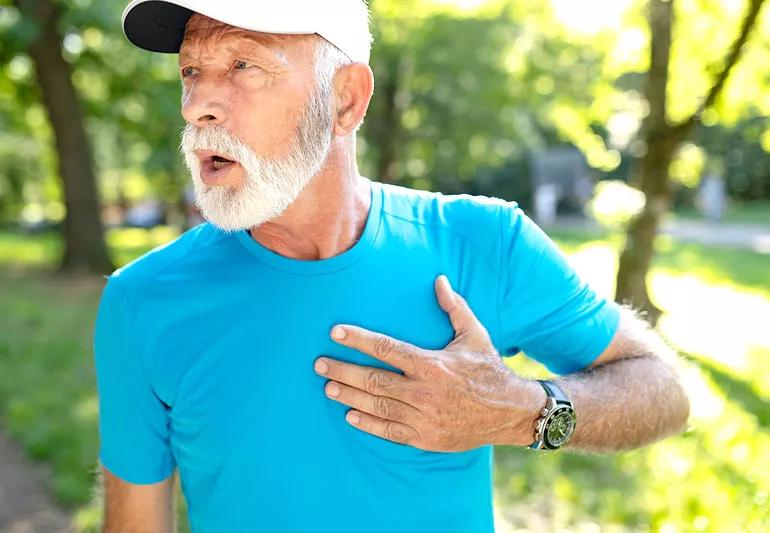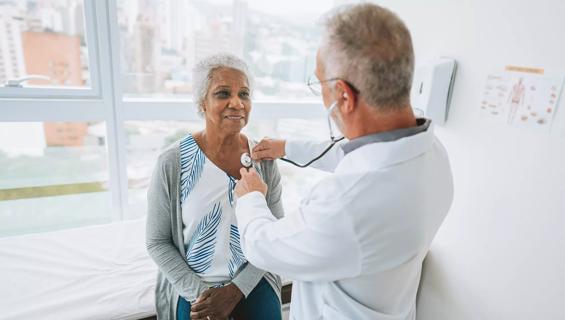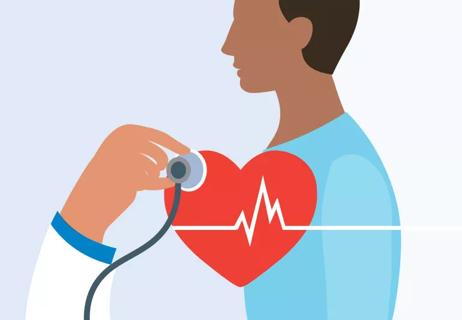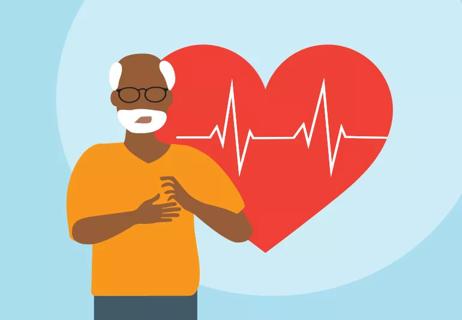Learn why anxiety can leave your heart pounding and what you can do about it

When we feel anxious, our bodies respond in physical ways. Sweaty palms, shaking and an upset stomach can set in. And it’s not uncommon to feel a pounding or fluttering in your chest, also known as a heart palpitation.
Advertisement
Cleveland Clinic is a non-profit academic medical center. Advertising on our site helps support our mission. We do not endorse non-Cleveland Clinic products or services. Policy
Cardiac electrophysiologist John Bibawy, MD, explains why this happens and what to do if you notice palpitations when you’re anxious.
“When you’re resting, you usually don’t feel your heart beating,” says Dr. Bibawy. “When you can feel your heartbeat, you’re having palpitations. Sometimes they’re expected, like after exercising. But other times, palpitations hit without warning.”
You might feel palpitations in your chest, neck or throat, and they feel like your heart is:
Anxious feelings engage your body’s “fight-or-flight” response. Fight-or-flight triggers a series of events in your body, including the release of certain hormones. Experts believe this response was helpful in ancient civilizations when humans had to fight or run from threats to survive.
Today, your fight-or-flight response works the same as it always has. It just doesn’t know the difference between a grizzly bear attack or an upcoming work presentation. So those same hormones — like adrenaline — kick in to protect you.
“The fight-or-flight response speeds up your heart rate, so your body gets more blood flow,” explains Dr. Bibawy. “The increased blood flow gives you a burst of energy to fight or run from danger. That’s why many people notice palpitations when they’re scared, nervous or anxious — and it’s completely normal. It doesn’t mean there’s something wrong with your heart.”
Advertisement
Fight-or-flight isn’t the only time heart rate and anxiety may overlap. Some people notice their heart speeding up or fluttering, which triggers fear or anxiety.
“People who have an arrhythmia — an abnormal heart rhythm — might experience sudden palpitations,” says Dr. Bibawy. “They understandably get nervous because they don’t know why these palpitations happen. The palpitations may cause anxiety, and anxiety causes more palpitations. This creates a cycle that’s hard to break.”
Nearly everyone experiences anxiety and stress at some time. A healthy heart can handle the heart racing with occasional anxiety and stress.
But if you have a heart condition like coronary artery disease or heart failure, work with a doctor to manage it. In these circumstances, anxiety and a fast heart rate can trigger chest pain.
“People with certain heart conditions may take prescription medications that keep their heart rate low,” says Dr. Bibawy. “The medications prevent a fast heart rate or palpitations if you get scared, for instance. If your heart condition is under control, then having occasional anxiety won’t be a problem.”
Frequent anxiety is another story. Chronic stress and anxiety aren’t good for your heart — or your health in general — so don’t let it slide.
“Untreated anxiety disorders can raise your blood pressure, lower your quality of sleep and interfere with your enjoyment of life,” says Dr. Bibawy. “See your healthcare provider if you frequently feel anxious or think you might have an anxiety or panic disorder. Treatments are available.”
Nearly everyone faces an anxiety-provoking situation at some point. Maybe you’re about to meet your future mother-in-law, or you have a performance evaluation at work. Whatever it is, there are some ways to help calm that fight-or-flight response and slow your heart rate:
Advertisement
Nearly everyone experiences anxiety and a racing heart on occasion — it’s part of being human. But don’t ignore frequent anxiety or palpitations, especially if they’re a new symptom. Your doctor can help you discover the causes and provide treatment if needed.
Most of the time, palpitations are just a sign that your heart is temporarily working a little harder. But sometimes, palpitations can be a sign of a heart condition like an arrhythmia.
“If you’re having palpitations, mention it to your doctor,” says Dr. Bibawy. “A cardiologist can find out what’s causing the palpitations or rule out health conditions. And if your palpitations ever cause dizziness or fainting, see a doctor right away.”
Advertisement
Learn more about our editorial process.
Advertisement

If you don’t have other symptoms, try using relaxation techniques and vagal maneuvers to calm your heart down

Chronic stress can trigger palpitations, inflammation, angina and other serious heart issues

Inactivity increases your risk of aches, pains and chronic diseases

Yes — and depending on the level of dehydration, you may need emergency care

Research shows a strong association between rheumatoid arthritis and heart issues

Knowing what you can do to prevent or manage heart disease is half the battle

A skipped heartbeat is usually your heart returning to its normal electrical path

Don’t self-medicate with vitamin supplements without consulting a doctor first

The best parenting style balances enforcing rules and showing plenty of love

Tips include cutting back on sugar, focusing on exercise and managing stress

It can be harder to let go when you’ve invested time, energy and emotions — but it might be the healthier choice long term